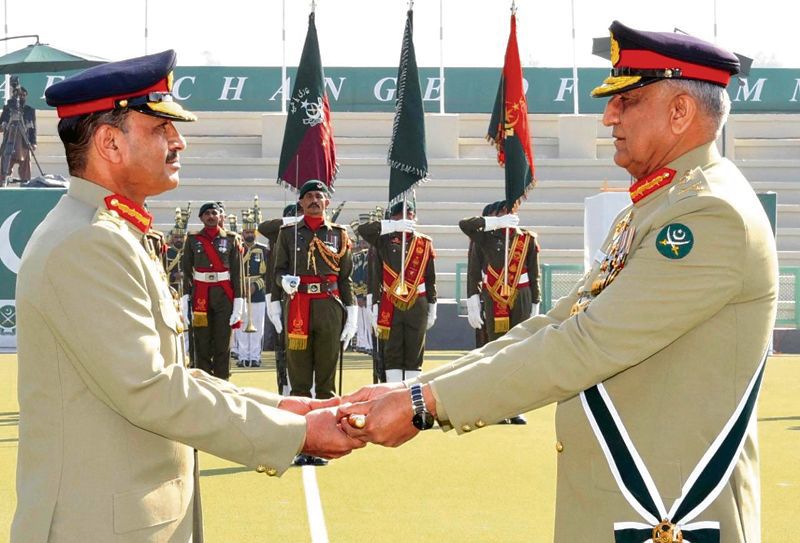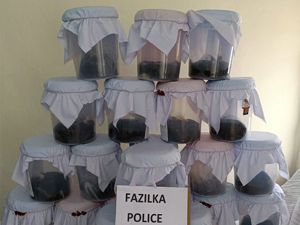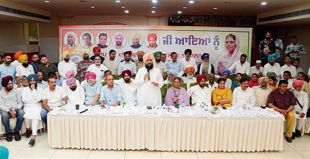
Control: Gen Syed Asim Munir (left) took over from Gen Qamar Javed Bajwa as the Pakistan army chief in November 2022. The army has ruled the country directly or indirectly since 1947. Reuters
Gen Deepak Kapoor (Retd)
Former Chief of Army Staff
SINCE 1947, India and Pakistan have fought four wars, including the one in 1971, when East Pakistan broke away with Indian assistance and became Bangladesh. They have opposed each other at every international forum, acquired nuclear weapons to gain strategic superiority and joined alliances to seek territorial and diplomatic advantage. To make up for its smaller size, Pakistan has not hesitated from using the communal card in a bid to destabilise India time and again and “bleed India with a thousand cuts” with its proxy war in J&K since 1989. Members of terrorist groups such as Lashkar-e-Taiba, Harkat-ul-Ansar and Hizbul Mujahideen continue to be trained and infiltrated into India for carrying out terrorist activities and creating destabilisation. As things stand, this situation is unlikely to change anytime soon.
During this entire period, through the shrill cacophony of revenge, there have been sane voices from both sides suggesting better relations between the two and progressing together in peaceful co-existence. Why these efforts have not produced the desired results, thus prolonging the status quo, needs to be analysed. In the current geopolitical environment, a continuing hostile stance between the two is likely to prove harmful to both, more so to Pakistan, due to its vulnerabilities.
Unlike in India, where a democratically elected government conducts foreign policy with all countries, including Pakistan, the civilian government in Pakistan must go by the wishes of the army while dealing with India. This creates a dichotomous situation wherein a clandestine hand seems to be controlling the outcome of direct talks.
The Pakistan army has ruled the country directly or indirectly for the past 77 years. Not having been popular while ruling the country directly, the army has conveniently indulged in back-seat driving by making the ‘selected’ government do its bidding. This ensures that it gets credit for all the good deeds, while unpopular decisions are attributed to the civilian government.
The army has maintained its position within the polity by branding India as Pakistan’s enemy No.1 in people’s minds while projecting itself as the saviour of the nation. It is not uncommon to find that for most things going wrong in Pakistan, India is generally the whipping boy. The army is adept at orchestrating an anti-India agenda from the background. The only negative aspect of such a game plan is that it cannot be played perpetually, thus exposing the perpetrators.
Punjabis have invariably dominated the government and all its important wings, even at the expense of depriving others of their fair share of government jobs. Thus, there is a strong undercurrent of resentment and alienation among Sindhis, Baluchis and Pakhtoons, giving a fillip to divisiveness. With the passage of time, this faultline is becoming more prominent.
The army has gradually expanded its overall control to almost all institutions in the country. The Fauji Foundation has been activated to control some of the economic activities. Recent reports of pressurising and threatening the judiciary to get favourable decisions for the ‘establishment’ have pointed to the subversion of judicial processes. Manipulation of the religious discourse to suit the aspirations of the military has resulted in creation of a suspicious and untrustworthy environment wherein the friction between the Shias and Sunnis has increased manifold. In fact, the minority Shias have been targeted more frequently by the Sunnis lately, thus heightening the discord.
There is also a feeling of alienation in the lower and middle ranks of the Pakistan army, especially since most spoils of power are being shared at the higher levels. It is this disenchantment that Imran Khan tried to exploit while taking on the army when he was the Prime Minister. His failure, of course, does not change the ground reality.
On the Indian side, the foreign policy of the country is the responsibility of the democratically elected government of India. Principally, it would be happy to have cordial neighbourly relations with Pakistan. Several past prime ministers of India have repeatedly shown their positive intent on this account. Negotiations have broken down either because of the last-minute pressure from the Pak army on their government or because of Pakistan going back on the agreed upon agreements. The Simla Agreement of 1972 is a glaring example.
The solution lies in weakening of the stranglehold of the army on the foreign policy of Pakistan vis-à-vis India. The public of the country needs to realise that the India-centric approach propagated and followed by the army has only hastened Pakistan’s slide. It is the inherent contradictions within the Pakistan polity, propped up and manipulated by the army, that are leading the country towards disintegration.
The moot question that arises is whether the military can be forced to jettison its prime position to stop Pakistan’s abysmal march to doomsday. There are murmurs of discontentment and unhappiness within Pakistan, especially since most aspects are weighed in comparison with India. The high-handed way the ‘establishment’ deals with all other institutions of the state is becoming clearer. Ultimately, it is the public in Pakistan that can bring about an end to the army’s domination. Nurturing and encouraging this thought process would help build a case for the long-term wellbeing of Pakistan as well as better relations with India.
Friendliness between India and Pakistan is possible only once acts inimical to each other are stopped. Pakistan needs to stop supporting the proxy war in J&K and terrorist activities in other parts of India. Resolution of other issues, including J&K, can happen as trust and confidence between the two builds up. In the long term, good neighbourly relations would benefit both countries.
Join Whatsapp Channel of The Tribune for latest updates.




























